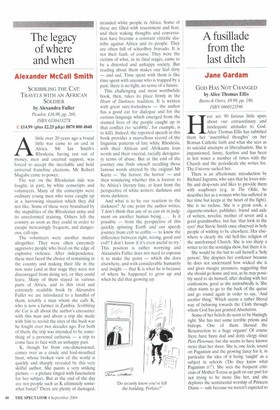The legacy of where and when
Alexander McCall Smith
SCRIBBLING THE CAT: TRAVELS WITH AN AFRICAN SOLDIER by Alexandra Fuller Picador, £16.99, pp. 269, ISBN 033043327X £14.99 (plus 12.25 p&p) 0870 800 4848 Alittle over 20 years ago a brutal little war came to an end in Africa. Mr Ian Smith's Rhodesia, having run out of money, men and external support, was forced to accept the inevitable and hold universal franchise elections. Mr Robert Mugabe came to power.
The war on the Rhodesian side was fought, in part, by white conscripts and volunteers. Many of the conscripts were ordinary young men who were caught up in a harrowing situation which they did not like. Some of these were brutalised by the stupidities of the Rhodesian army and its unreformed training. Others left the country as soon as they could in order to escape increasingly frequent, and dangerous, call-ups.
The volunteers were another matter altogether. They were often extremely aggressive people who lived on the edge of explosive violence. After independence, these men faced the choice of remaining in the country and making their life in the new state (and at that stage they were not discouraged from doing so), or they could leave. Many of them stayed in various parts of Africa, and in this vivid and extremely readable book by Alexandra Fuller we are introduced to a handful of them, notably a man whom she calls K, who is now a farmer in Zambia. Scribbling the Cat is all about the author's encounter with this man and about a trip she made with him to revisit the sites of the bush war he fought over two decades ago. For both of them, the trip was intended to be something of a personal catharsis — a trip to come face to face with an unhappy past.
K, though far from one-dimensional, comes over as a crude and foul-mouthed boor, whose broken view of the world is quickly and sharply revealed by this very skilful author. She paints a very striking picture — a picture tinged with fascination for her subject. But at the end of the day are not people such as K ultimately somewhat banal? There are plenty of damaged, stranded white people in Africa. Some of these are filled with resentment and fear, and their waking thoughts and conversation have become a constant vitriolic diatribe against Africa and its people. They are often full of schoolboy bravado. It is not their fault, of course. They were the victims of what, in its final stages, came to be a distorted and unhappy society. But reading about them makes one feel dirty — and sad. Time spent with them is like time spent with anyone who is trapped by a past: there is no light, no sense of a future.
This challenging and most worthwhile book, then, takes its place firmly in the Heart of Darkness tradition. It is written with great sure-footedness — the author has a good ear for dialogue and for the curious language which emerged from the stunted lives of the people caught up in that conflict (to 'scribble', for example, is to kill). Indeed, the reported speech in this book provides a marvellous record of the linguistic patterns of late white Rhodesia, with their African and Afrikaans loan words and their visceral, racially derogatory terms of abuse. But at the end of the journey one finds oneself recalling those famous words uttered by the original Mr Kurtz — 'the horror, the horror' — and then wondering whether this is forever to be Africa's literary fate, at least from the perspective of white writers: darkness and more darkness.
And what is to he our reaction to the darkness? At one point the author writes, 'I don't think that any of us can sit in judgment on another human being... . Is it possible — from the perspective of this quickly spinning Earth and our speedy journey from crib to coffin — to know the difference between right, wrong, good and evil? I don't know if it's even useful to try.' This position is rather worrying and Alexandra Fuller does not need to espouse it to make the point — which she does elsewhere, and with considerable humanity and insight — that K is what he is because of where he happened to grow up and when he did that growing up.


































































 Previous page
Previous page